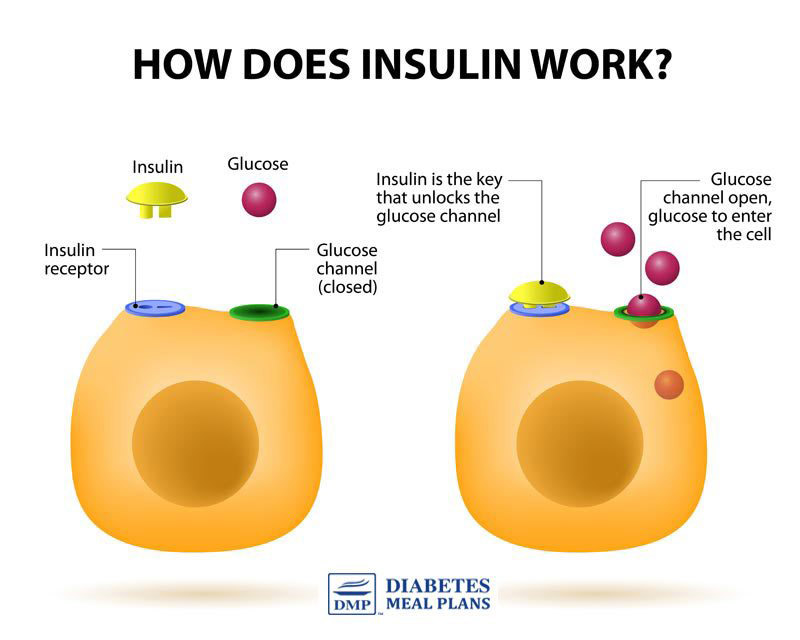With prediabetes, it’s not uncommon to also have associated conditions like high cholesterol, high blood pressure, fatty liver, overweight or obesity.
One thing to understand is that your high blood sugar and these other conditions are all connected!
Basically, when you have prediabetes, your metabolism has become altered.
An altered metabolism means that your body’s process of converting food into energy is not functioning optimally, leading to imbalances in the way nutrients are utilized and stored.
The good news is, with a good diet plan, you can reset your metabolism so your prediabetes, high cholesterol and other issues are all treated at the same time.
Understanding Prediabetes
Prediabetes is like a warning sign that your body is struggling to manage blood sugar properly. Your blood sugar levels are higher than normal, but not high enough to be classified as diabetes (yet).
One of the main contributing factors to prediabetes is insulin resistance.
An organ in your body called the pancreas, produces a hormone called insulin to help regulate blood sugar levels by allowing glucose (sugar) to enter your cells for energy (see the image below).

In prediabetes, your cells become less sensitive to insulin, which means they don’t respond well to the hormone – the key doesn’t work effectively to open the cells.
As a result, your body needs to produce more insulin to keep blood sugar levels in check, leading to higher blood sugar levels.
The issue is: high insulin levels in the body can cause havoc.
Understanding High Cholesterol in Prediabetes
Increased insulin levels can have an impact on cholesterol levels.
While insulin helps regulate blood sugar levels, insulin also plays a role in lipid (fat) metabolism, which includes the production, transportation, and storage of fats in the body.
What this means is that your prediabetes and increased insulin levels can directly affect cholesterol levels, in the following ways:
- Increased triglyceride production: When insulin levels are high, the liver produces more triglycerides, a type of fat found in the blood.
- Reduced clearance of LDL cholesterol: Insulin helps regulate the removal of LDL cholesterol (the “bad” cholesterol) from the bloodstream. When insulin levels are elevated, the clearance of LDL cholesterol can be reduced, leading to increased LDL cholesterol levels in the blood.
- Altered HDL cholesterol levels: High insulin levels can also negatively affect HDL cholesterol (the “good” cholesterol) by lowering its levels in the blood. HDL cholesterol helps to remove excess LDL cholesterol from the bloodstream.
- Changes in LDL particle size: High insulin levels can lead to the production of smaller, denser LDL particles, which are more likely to contribute to plaque buildup in the arteries than larger, less dense LDL particles.
Overall, increased insulin levels can contribute to an unfavorable cholesterol profile, with higher levels of LDL cholesterol and triglycerides and lower levels of HDL cholesterol.

Best Diet Plan For Prediabetes and High Cholesterol
It’s a common misconception that a low-fat diet is the best choice for managing cholesterol.
However, there are good reasons why a low-fat diet is NOT the best diet plan for treating prediabetes or cholesterol:
- Overemphasis on fat reduction: A low-fat diet often focuses on cutting fat intake across the board, which may lead to a reduced consumption of healthy fats as well. As a result, you might miss out on the cholesterol-lowering benefits of unsaturated fats.
- Increased carbohydrate intake: When people follow a low-fat diet, they often replace fats with carbohydrates, especially refined carbs like white bread, pasta, and sugary snacks. Unfortunately, these carbs can raise blood sugar and insulin levels, leading to increased production of LDL cholesterol and triglycerides.
- Lack of satiety (feeling full): Fat plays a vital role in making you feel full and satisfied after a meal. A low-fat diet might leave you feeling hungry and unsatisfied, increasing the likelihood of mindless snacking, overeating and weight gain, which can negatively impact cholesterol levels.
The best diet plan for prediabetes and cholesterol is a low carbohydrate diet!
Yes, low carb diets (no we’re not talking keto) increase your fat intake and for many people that seems counterintuitive. But the thing is, fat is an essential nutrient!
Overwhelmingly, the main issue is carbohydrate foods.
Carbohydrate foods and a high carbohydrate diet, drive higher cholesterol levels.
Limiting carbs found in sugary foods, pasta, and bread while focusing on consuming whole foods rich in high-quality proteins, healthy fats, and fiber-packed vegetables is essential to resetting your metabolism back to normal function.
The role of your prediabetes diet is to help stabilize blood sugar levels, lower insulin levels and in turn, regulate your cholesterol profile and other associated health concerns.
Getting Started with a Low Carb Diet Plan
Consider joining us as a member for everything you need to know to follow a healthy low carb diet plan (no we’re not talking keto diets here).
A healthy low carb diet is a way of eating that focuses on reducing the overall amount of carbohydrates you eat and replacing them with more nutrient-dense options, along with healthy fats and proteins.
A few basics include:
- Focus on whole foods, like vegetables, lean meats, fish, eggs, nuts, seeds, and dairy products.
- Reduce “healthy” complex carbs, such as whole grains and starchy vegetables (potatoes).
- Include healthy fats, like avocado, olive oil, and fatty fish, which can help you feel full and satisfied.
If you’re ready to make positive diet change right now, join us as a member for all the info, tools and resources you need to improve your eating plan to lower cholesterol, A1c and improve your health.



Deborah
I have Colitis which limits foods for me. Therefore I eat too many carbs as they are soft and I crave sugar.
Dr Jedha
Colitis can make things a bit more challenging with diabetes but there are always ways to work around things to address both conditions.